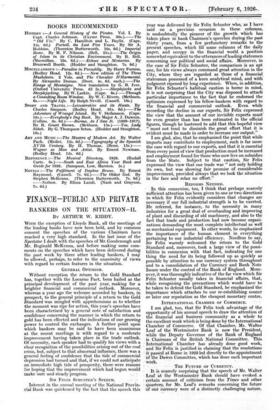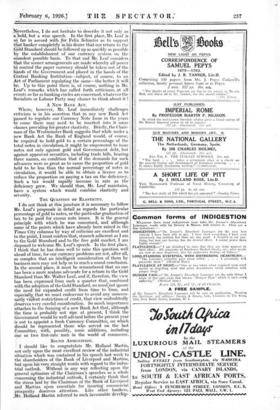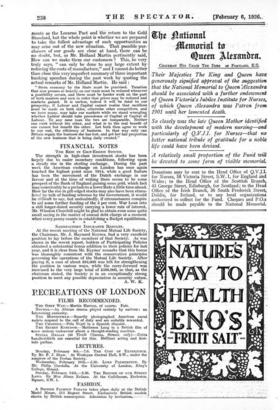FINANCE-PUBLIC AND PRIVATE
BANKERS ON THE SITUATION-II.
By ARTHUR W. KIDDY.
WITH the exception of Lloyds Bank, all the meetings of the' leading banks have now been held, and by common consent the speeches of the various Chairmen have reached a very high standard. In the last issue of the Spectator I dealt with the speeches of Mr. Goodenough and Mr. Reginald McKenna, and before making some com- ments on the speeches which have been delivered during the past week by three other leading bankers, I may be allowed, perhaps, to refer to the unanimity of views with regard to certain features in the situation.
GENERAL OPTIMISM.
Without exception the return to the Gold Standard has, together with the Locarno Pact, been hailed as the principal development of the past year, making for a brighter financial and commercial outlook. Moreover, whereas a year ago the welcome accorded by bankers, in prospect, to the general principle of a return to the Gold Standard was mingled with apprehensions as to whether the moment was ripe for action, this year's speeches have been characterized by a general note of satisfaction and confidence concerning the manner in which the return to gold has been effected and the indications of our growing power to control the exchanges. A further point upon which bankers may be said to have been unanimous at the recent meetings is with regard to a moderate improvement having taken place in the trade outlook. Of necessity, each speaker had to qualify his views with a clear recognition of the possibilities arising out of the coal crisis, but, subject to that abnormal influence, there was a general feeling of confidence that the tide of commercial depression had turned and that, if we could not anticipate an immediate high tide of prosperity, there were reasons for hoping that the improvement which had begun would make sure and steady progress.
SIR FELIX SCHUSTER'S SPEECH. • Interest in the annual meeting of the National Provin- cial -Bank was quickened by the fact that the speech this year was delivered by Sir Felix Schuster who, as I have said on a previous occasion in these columns, is undoubtedly the pioneer of the growth which has taken place in bank Chairmen's speeches during the past thirty years, from a few perfunctory iemarki to the present speeches, which fill some columns of the daily paper, and occupy in the financial world a position somewhat equivalent to the utterances of leading statesmen concerning our political and social affairs. Moreover, in the case of Sir Felix Schuster; the comparison is an apt one, for his views always command great attention in the _City, where they are regarded as those of a financial statesman possessed of a keen analytical mind, and with judgment ripened by long experience. When, in addition, Sir Felix Schuster's habitual caution is borne in mind, it is not surprising that the City was disposed to attach particular importance to the fact that he endorsed the optimism expressed by his fellow-bankers with regard to the financial and commercial outlook. Even while recording the decline in our exports, Sir Felix expressed, the view that the amount of our invisible exports must' be even greater than has been estimated in the official; figures, though he hastened to add that this hopeful view " must not tend to diminish the great effort that it is evident must be made in order to increase our output."
I am glad, also, that he emphasized the point that while imports may contribute to employment, such is far more the case with regard to our exports, and that it is essential from every point of view that production must be increased and employment found for those who now live on subsidies from the State. Subject to that caution, Sir Felix expressed the view that our trade was " not Only holding its own, but was showing fair promise of considerable improvement, provided always that we look the situation in the face and relax no effort."
REFORMS NEEDED.
In this connexion, too, I think that perhaps scarcely sufficient attention has been given to one or two directions in which Sir Felix evidently considers that changes are necessary if our full industrial strength is to be exerted. He referred, for instance, to the necessity in many industries for a great deal of overhauling and improving of plant and discarding of old machinery, and also to the fact that trade and production had now become organi- zations demanding the most complete intellectual as well as mechanical equipment. In other words, he emphasized the importance of the human element in everything pertaining to our industrial efficiency. Needless to say, Sir Felix warmly welcomed the return to the Gold Standard and, moreover, took a large view of the possi- bilities in connexion with that fact, indicating for one thing the need for its being followed up as quickly as possible by attention to our currency system throughout and to a consolidation of the Currency and Bank Note Issues under the control of the Bank of England. More- over, it was thoroughly indicative of the far view which Sir Felix Schuster usually takes in financial affairs, that, while recognizing the precautions which would have to be taken to defend the Gold Standard, he emphasized the importance which attaches to our re-establishing sooner or later our reputation as the cheapest monetary centre.
INTERNATIONAL CHAMBER OF COMMERCE.
I am glad, too, that Sir Felix took advantage of the opportunity of his annual speech to draw the attention of the financial and business community as a whole to the excellent work which is being done by the International Chamber of Commerce. Of that Chamber, Mr. Walter Leaf of the Westminster Bank is now the President, while the Deputy Governor of the Bank of England is Chairman of the British National Committee. This International Chamber has already done good work, and Sir. Felix is justified in claiming that the resolutions it-passed at Rome in 1928 led directly to the appointment • of the Dawes Committee, which has done such important work. - Tim FUTURE OF CURRENCY.
• It is scarcely surprising that the speech of Mr. Walter - Leaf at the Westminster Bank should have evoked a certain amount of criticism from the Times and other quarters; for Mr. Leaf's remarks concerning the future of our currency were of a distinctly challenging nature.
THE QUESTION OF ELASTICITY.
I do not think at this juncture it is necessary to follow Mr. Leaf's proposals in detail as regards the particular percentage of gold to notes, or the particular graduation of tax to be paid for excess note issues. It is the general principle with which he was - concerned, and although some of the points which have already been raised in the Times City columns by way of criticism are excellent and to the point, I must confess that, staunch adherent as I am to the Gold Standard and to the free gold market, I am disposed to welcome Mr. Leaf's speech. In the first place, I think that he has done well to raise this question well ahead of time, for our currency problems are not, after all, so complex that an intelligent consideration of them by business men may not help us to reach a sound conclusion. In the second place, it must be remembered that no one has been a more zealous advocate for a return to the Gold Standard than Mr. Walter Leaf, and if, therefore, the view has been expressed from such a quarter that, combined with the adoption of the Gold Standard, we mustnot ignore the need for expanded credit from time to time, and especiallL that we must endeavour to avoid any unneces- sarily via_ lent restrictions of credit, that view undoubtedly Ileserves very careful consideration. So much importance attaches to the framing of a new Bank Act that, although the time is probably not ripe at present, I think the Government would be well advised before the present year is out to appoint a fresh Currency Committee„ on which 4hould be represented those who served on the last Cmmittee, with,' possibly, some additions, including One or two first-rate men in the world of commerce.
Sour.rn ADMONITION.
I should like to congratulate Mr. Holland Martin, not only upon the most excellent review of the industrial situation which was contained in his speech last week to the shareholders of the Bank of Liverpool and Martins, but upon his very straight words with regard to the indus- trial outlook. Without in any way reflecting lipon the general optimism of the Chairman's speeches as a whole concerning the industrial outlook, I certainly think that the stress laid by the Chairman of the Bank of Liverpool and Martins upon essentials for insuring commercial prosperity deserves attention. Like other bankers, ,Mr. Holland Martin referred to such favourable develitsp- Nevertheless, I do not hesitate to describe it not only as
bold, bold, but a wise speech. In the first place, Mr. Leaf is so:, far in accord with Sir Felix Schuster as • fo support that banker completely in his desire thitt our return to the GOld Standard should be followed up as quickly as possible by the establislurient of our currency system on the soundest possible basis. To that end Mr. Leaf considers that the sooner arrangements are made whereby all power to control the paper currency should be taken out of the hands of the Government and placed in the hands of the Central Banking Institution—subject, of course, to an Act of Parliament regulating the same—the better it will be. Up to this point there is, of course, nothing in Mr. Leaf's remarks which has called forth criticisms, at all events so far as banking circles are concerned, whatever the Socialists or Labour Party may chance to think about it !
A NEW BANE ACT.
Where, however, Mr. Leaf immediately challenges criticism is in his assertion that in any new Bank Act ;passed to regulate our Currency Note Issue in the years Ito come there may need to be inserted into it some clauses providing for greater elasticity. Briefly, the Chair- man of the Westminster Bank suggests that while under a new Bank Act the Bank of England would, of course, be required to hold gold to a certain percentage of the total notes in circulation, it might be empowered to issue notes not only against gold and Government debt, but against approved securities, including trade bills, bearing three names, on condition that if the demands for such advances were so great as to cause the proportion of gold held to be less than the normal percentage of notes in circulation, it would be able to obtain a licence so to reduce the proportion on paying a tax on the deficiency: Such a tax would rapidly increase in rate as the deficiency grew. We should thus, Mr. Leaf maintains, have a system which would combine elasticity and severity. . - ments as the LocarnO Pact and the return to the Gold Standard, but the whole point is whether we are prepared to take the fullest advantage of such opportunities as may arise out of the new situation. That possible pur- chasers of our goods are close at hand, there can be no doubt, but, as Mr. Holland Martin pertinintly said,' Row can we make them our customers ? This, he very truly says, " can only be done to any large extent by reducing the costs of manufacture," and I cannot do better than close this very imperfect summary of three important banking speeches during the past week by quoting the actual remarks of Mr. Holland Martin. He said : " Stern economy by the State must be practised. Taxation that now presses so heavily on our trade must be reduced whenever a possibility occurs, and there must be harder work on the part of 'both, masters and men in order that prices may be reduced and markets gained. It is useless, indeed it will be fatal - to our prosperity, if Labour and Capital cannot realize that sacrifices must be made on both sides, otherwise other competitors, and we have many, may take our markets while we stand wrangling whether Labour should take precedence of Capital or Capital of Labour.- To any sane man the two are inseparable. Neither can exist without the other, and what is to the real benefit of one cannot but benefit the other. Let both then agree to work to one- end, the efficiency of business. In that way only 'can Britain regain the business she has lost, and get her fair proportion of the new .business that is being daily created."




























































 Previous page
Previous page